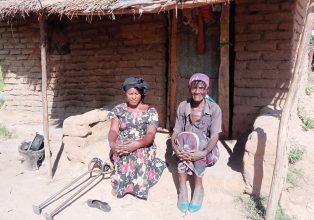High nurse to patient ratio still a challenge

When Chisomo Banda, 21, of Traditional Authority (T/A) Machinjiri in Blantyre applied for a nursing course at Trinity College of Nursing in 2011, her dream was to work in one of the country’s health facilities.
“My dream was short lived. Government withdrew nursing [training] funding when I was in my first year and my parents could not afford private tuition,” says Banda, who was forced to drop out.
Many nursing students in Christian Health Association of Malawi (Cham) colleges and Mzuzu University (Mzuni) have failed to continue with their training after government and other sponsors had failed to honour the nursing scholarship pledges. Health personnel training is expensive and most parents cannot afford it. Mzuzu University and Cham colleges tuition for health courses ranges between K300 000 and K800 000 per year.
Faced by the challenge of few medical personnel in the country, government went into partnership with Cham colleges to train additional health professionals by offering scholarships.
The Cham website shows the association has 10 training colleges and produces about 77 percent of nursing personnel in Malawi, 40 percent of whom are supported by government.
“In January, Trinity College admitted students on private tuition because government funding was not ready, but it came later,” said one lecturer, adding that the worst situation was registered between 2010 and 2012 when government could not release funding.
Malawi ranks among countries with the highest nurse to patient ratio in the world. Training institutions such as Malawi College of Health Sciences, Kamuzu College of Nursing (KCN) and the College of Medicine have their admission figures growing at a snail’s pace.
A World Health Organisation (WHO) bulletin published on its website quotes Deena Nardi, director of the nurses delegation programme at the International Council of Nurses, as saying by 2010, there were 17 nurses per 100 000 patients in Malawi. But in March this year, the Global Aids Interfaith Alliance (Gaia) International said there are now 34 nurses per 100 000 patients.
Although there is a slight improvement, this ratio is still high compared with the recommended 500 nurses per 100 000 patients.
A recent visit to Queen Elizabeth Central Hospital in Blantyre exposed the struggles health personnel go through by serving tens of patients per day. There were long queues especially at the pharmacy window. In wards such as paediatrics, some patients were sharing beds while others slept on the floor.
It was the same story at the outpatient department, where there were long queues of patients waiting to meet one doctor, and those arriving after 3pm were being turned back.
Between 1998 and 2008, the country’s population rose from 9.9 million to 14 million and projections indicate that the population is over 15 million, according to the 2008 Malawi Population and Housing Census.
However, the number of health personnel has been growing slowly. Nurses and Midwives Council of Malawi (NMCM) statistics show the number of midwives has risen from 6 889 in 2005 to only 11 122. Minister of Health Dr Jean Kalilani says through health partnership, government has trained an additional 6 000 nurses, but says there is still a huge deficit for medical staff.
At Muloza Health Centre in Mulanje, two midwives handle 1 721 expectant women per year. Nkhata Bay district health officer Dr Albert Mkandawire says instead of 154 midwives, the district has only 70 midwives who handle nearly 10 800 deliveries per year.
“The country has about 750 health facilities and most of them are manned by a midwife who also serves as a nurse for various adult sections,” Thokozire Lipato, acting registrar for NMCM told The Nation on May 11.
But why is Malawi facing such a shortage of health workers when there are many training institutions in the country?
Professor Address Malata, principal for KCN in a recent interview with MBC television, said Malawi lacks seriousness in training health workers. She said despite huge support from donors, few health workers graduate each year and chances for a practising medical worker to upgrade remains minimal.
WHO is encouraging countries to find ways of training more health personnel.




